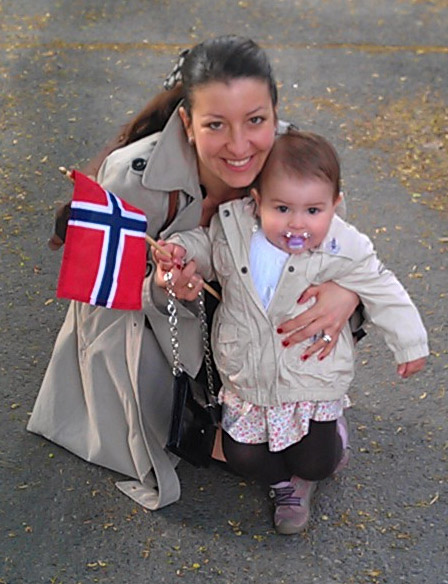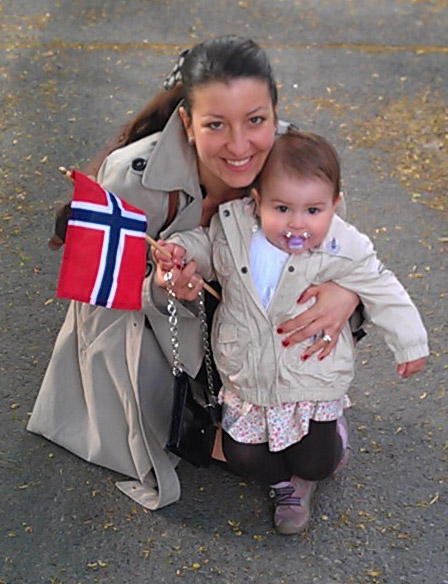 I grew up in a country were mangos grew in my backyard, where music is omnipresent and men love dancing, where the sun starts shining at 5:30 a.m. I’ve spent the last 14 years away from my home, El Salvador, and it’s taught me to become adaptable. But before me lies the biggest integration challenge I have ever faced: the upbringing of my daughter, Sophie.
I grew up in a country were mangos grew in my backyard, where music is omnipresent and men love dancing, where the sun starts shining at 5:30 a.m. I’ve spent the last 14 years away from my home, El Salvador, and it’s taught me to become adaptable. But before me lies the biggest integration challenge I have ever faced: the upbringing of my daughter, Sophie.
It has always been clear to me that my children should feel proud of the cultures they were born into. In Sophie’s case, it’s living in Norway with a French-Salvadorian mother and a Norwegian father.
Although she is only 1 and a half years old, I have already experienced cultural clashes in her upbringing, some of which have led to heated debates with her father. For example, ear piercing. In El Salvador, baby girls have their ears pierced within the first two months. In Norway, however, it is practically considered child abuse.
With this in mind, I started wondering: What other extreme differences will I discover as she grows up? Will they be so insurmountable that my daughter could grow away from me, culturally? How do I raise her to appreciate her multicultural background?
From day one I have spoken to Sophie in Spanish, and I looked forward to the day when she would pronounce her first words. Reality hit me on the face when I heard her say “shoe” not in Spanish, but in Norwegian. That’s when I realized that her understanding of her origins was not going to be natural or automatic. I was going to have to work at it.
I feel it is my duty to share our family heritage with Sophie. No matter where I move, family is where my home is. But, this task is easier said than done. Nordic and Latino cultures are completely different, if not opposite. Where will she find her footing?
I remember once when I was 5 years old, I corrected my uncle at the dinner table. He ate the American way, switching utensils between hands, and my parents taught me the French way. My mother scolded me without me knowing why. The day will come when I will have to make sure Sophie understands that in different cultures, there are different ways of doing things. This is part of teaching tolerance, and what better way than being immersed in many different cultures at once!
We live in a globalized world where cultural insight and bilingualism are an advantage and sometimes a necessity. I know these are powerful assets that can help my kids hit the ground running wherever they land.
To help Sophie discover our family origins, I believe the key is to expose her to my cultures in a positive way. Here are three ways that I am attempting this:
1. My entry ticket is speaking my language. It is the one thing she cannot resist, at least at the beginning! Persistence and patience are crucial to succeed in the long run. Movies, videos, music and books are great helpers. Technology is your friend: Sophie and I Skype regularly with my mom and sister. As a result, she learns Spanish and gets to know the family between visits.
2. Hang on to traditions. National days, birthdays, traditional meals and foods… your creativity is the limit! I remember my dad would make up bedtime stories. The hero was always a family member, but we wouldn’t know it until the end, when he crowned the unexpected ending with an uncle’s name.
3. Stay true to your values, the ones you grew up with. I know the decisions I make in my children’s upbringing will at some point differ from the majority of parents in their social circle. Kids want to be part of the group, not different, because difference means exclusion. However, understanding where the difference comes from can help them see it as positive rather than segregating.
Just like respect and authority are not a given, raising children with cultural awareness is something you need to work at if you want it to gradually become a part of their identity and an anchor to your family. Children learn more from example than words, so be authentic.
My wish is to provide Sophie with as many tools as possible to be happy in this world. Eventually, she will make her own cultural choices, and I must be prepared to respect them. I can only do my best to show her how her multicultural background is a gift, and only she can decide how to make the best out of it.

Thank you for writing this.
My husband and I are both American born, so we share a common culture. However, he is a first generation Indian-American, while I’m something like 6th or 7th generation one. I have no ties, cultural or familial to Western Europe. However, Ravi has aunts, uncles, cousins, etc still in Bombay.
As a child he was extremely resistant to learning Gujarati (their ethnic language) much less Hindi. He hates Indian food. He doesnt like Indian movies or music. The family joke is that I, the white daughter in law, am the Indian child as I like all of the above, but have only learned a few words/phrases in Gujarati.
I have always struggled with how to convey to our elder daughter Elanor, now 2 1/2, both sides of her culture. This already thorny issue became more complicated when we moved from Boston (where both sides of the family live) to Singapore a year ago.
My husband doesn’t really stress over any of this. He figures she’ll pick up American culture in the home and on visits back to the US, some mandarin in school, and feels slightly betrayed that she loves Indian food. From what I understand, it’s not uncommon for a first generation kid like him to reject their parents culture, but it makes it tougher for me, in the long run.
LikeLike
Hi Gisèle,
thanks for talking about your experience about Norway and about raising your lovely baby girl.
me and my husband and our daughter might move to Norway and your reply on this web http://www.expatarrivals.com/answers/cost-of-living-in-oslo-norway comfort me and your blog let me know that there is still positive person can give me a fair idea about am going to face, even am from a very different culture but really excellent effort in your blog.
thanks a lot
LikeLike
Thanks for the article. I am in a similar situation, being German with a British husband bringing up two small children in France. I would very much appreciate contact to other parents.
LikeLike